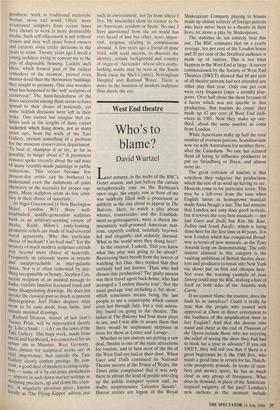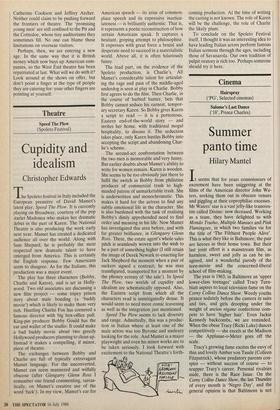West End theatre
Who's to blame?
David Wurtzel
Last autumn, in the midst of the RSC's Genet season, and just before the curtain metaphorically rose on the Barbican's open stage, the empty row in front of me was suddenly filled with a procession as unlikely as the one about to appear in The Balcony. Here, to watch a play about whores, transvestites and the Establish- ment-as-grotesqueries, were a dozen im- maculately well-groomed American mat- rons, expertly coiffed, tastefully bejewel- led and elegantly and sedately dressed. What in the world were they doing here?
In the interval, I asked, 'Did you know what this play was going to be about?' Recovering their breath from the horror of watching Act One, they replied that they certainly had not known. Then who had chosen this production? The guilty person was their travel agent back home, who had arranged a 'London theatre tour'. Not the usual package tour including a 'hit show', which sometimes means being the last people to see a catastrophe which cannot even last through July, but a visit ostens- ibly based on going to the theatre. The ladies at The Balcony had four more plays to see, and I was able to assure them that there would be unpleasant surprises in store for them at Lettice and Lovage.
Whether or not visitors are getting a raw deal, theatre is one of the main attractions for tourists, and in turn most of the ills of the West End are laid at their door. When Guys and Dolls continued its National Theatre success at the Prince of Wales, the Times critic complained that it was only there to attract the kind of people who clog up the public transport system and; no doubt, mispronounce 'Leicester Square'. Horror stories are legion of the Royal
Shakespeare Company playing to houses made up almost entirely of foreign patrons who have never been to a theatre in their lives, let alone a play by Shakespeare.
The statistics do not entirely bear this out. The RSC estimates that on a yearly average, ten per cent of the London house and 20 per cent of the Stratford audience is made up of visitors. This is not what happens in the West End at large. A survey commissioned by the Society of West End Theatres (SWET) showed that 60 per cent of all theatre patrons had not attended any other play that year. Only one per cent were very frequent (once a month) play- goers. Over half chose the show because of a factor which was not specific to that production. But tourists do count: they made up 42 per cent of West End audi- ences in 1985. Now they make up one- third, about the same number as come from London.
While Americans make up half the total number of overseas patrons, Scandinavians now vie with Australians for number three, after the Canadians. No one has accused them of trying to influence producers to put on Strindberg or Ibsen, and almost none do.
The great criticism of tourists is that somehow they vulgarise the productions which the rest of us wind up having to see.
Musicals come in for particular scorn. This may be a left-over from the time when English tastes in homegrown musicals made Anna Neagle a star. The fact remains that London not only does good revivals, but it revives the very best musicals — not
just Guys and Dolls but Kiss Me Kate, Follies and South Pacific, which is being
done here for the first time in 40 years. It is now London which has conquered Broad- way in terms of new musicals, as the Tony Awards keep on demonstrating. The only sinister element in this category is the vaulting ambitions of British theatre direc-
tors and producers to break into New York via shows put on first and cheaper here. Not even the warning example of Jean Seberg could stop the RSC making a fool of itself on both sides of the Atlantic with Carrie.
If we cannot blame the tourists, does the fault lie in ourselves? Could it really be true that the people who roared with
approval at Chess in direct correlation to the loudness of the amplification were in
fact English? And that the dozens who
stand and cheer at the end of Phantom of the Opera include those who are enjoying
the relief of seeing the show they had had to book for a year in advance? If you ask SWET, they will tell you that if there is a great bogeyman he is the 1988 Brit, who wants a good time in return for his Thatch- erite prosperity pounds. In terms of num- bers and money spent, he has as much clout as any group of foreigners. What does he demand, in place of the American- inspired vulgarity of the past? London's new authors at the moment include Catherine Cookson and Jeffrey Archer. Neither could claim to be pushing forward the frontiers of theatre. The 'promising young men' are still confined to the Pit and the Cottesloe, whose tiny auditoriums they sometimes fill. No one can blame these limitations on overseas visitors.
Perhaps, then, we are entering a new age. In the same way that it is British money which now buys up American com- panies, so the West End theatre has been repatriated at last. What will we do with it? Look around at the shows on offer, but don't point a finger at the type of people they are catering for: your other fingers are pointing at yourself.



















































 Previous page
Previous page